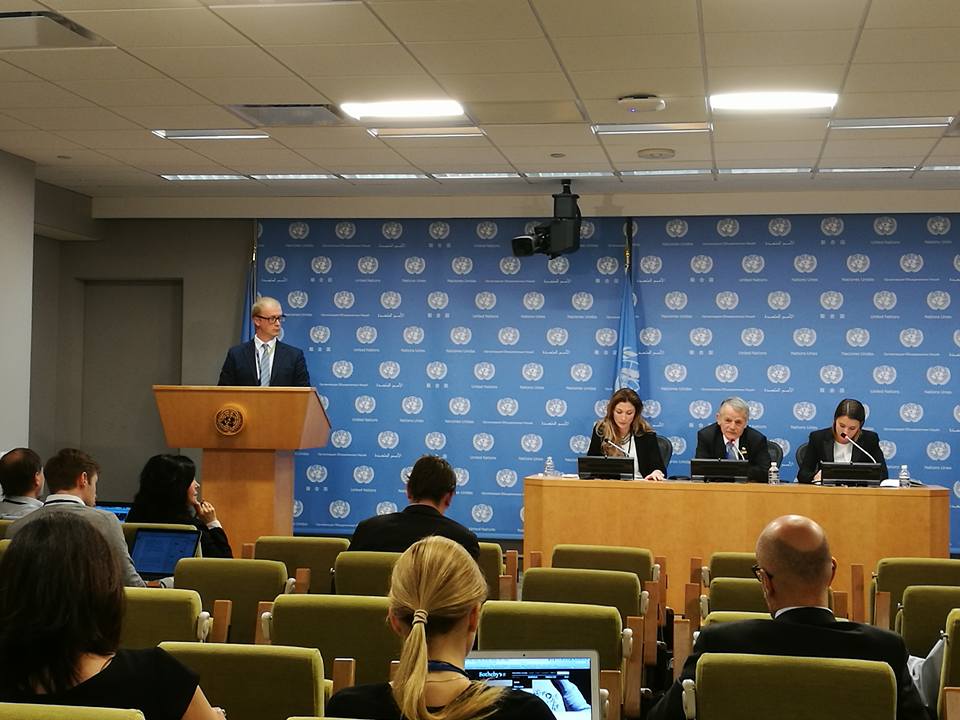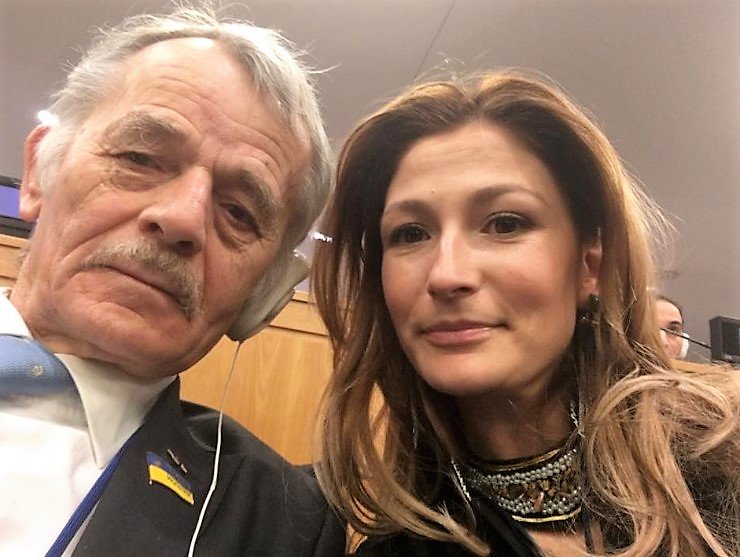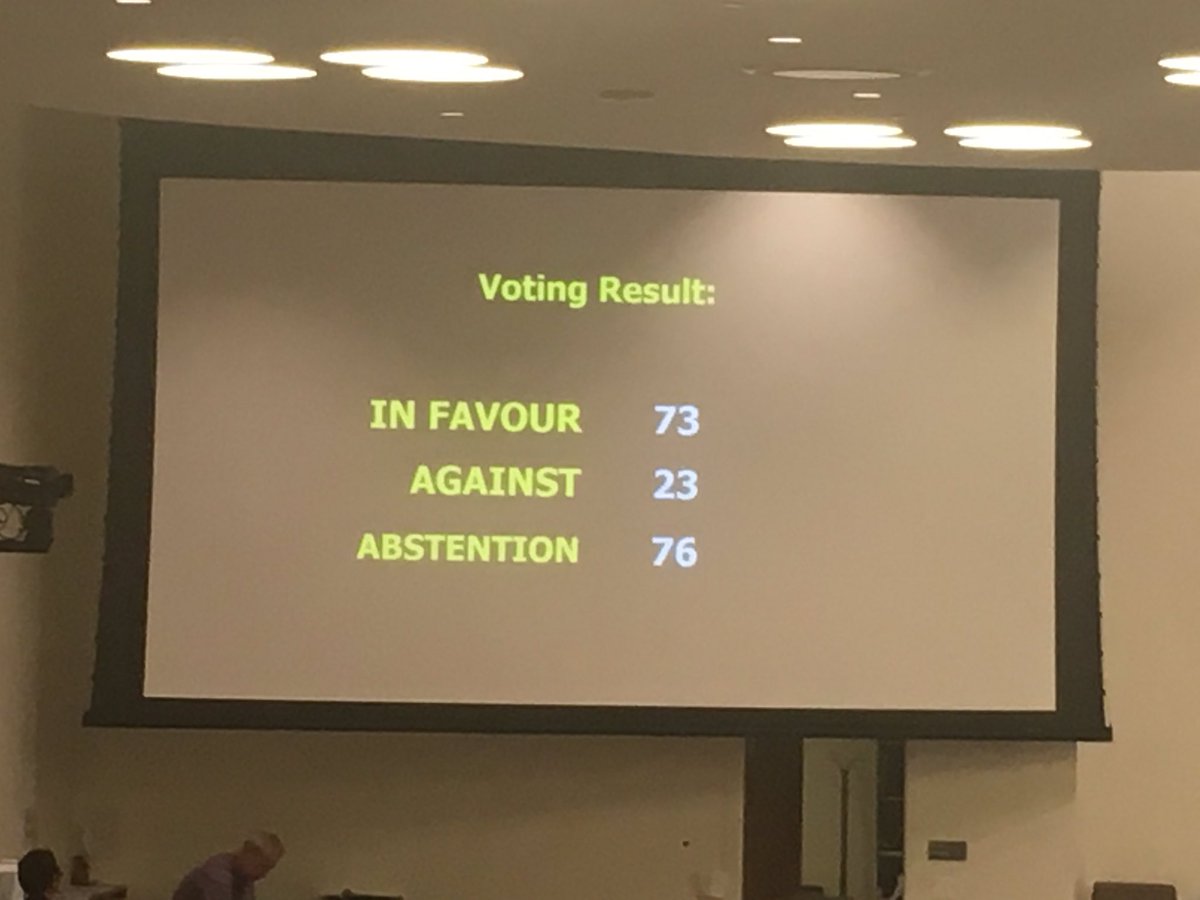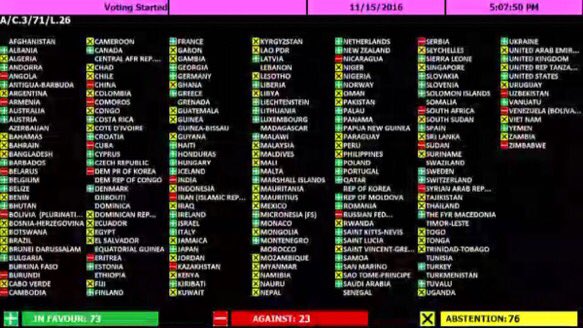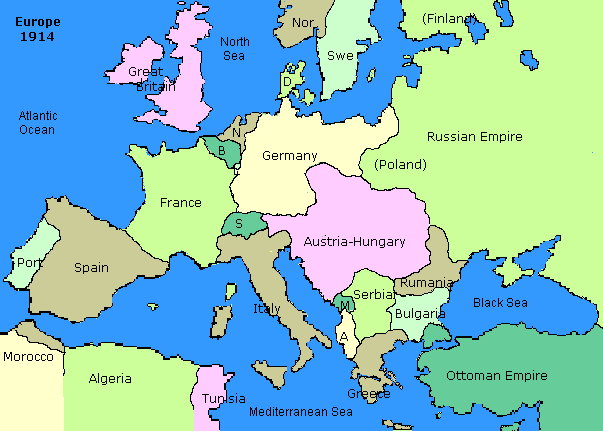The draft resolution on the human rights situation in the temporarily autonomous Republic of Crimea and the city of Sevastopol was approved by a vote of 73 in favour, to 23 against with 76 abstentions. By its terms, the Assembly would call for the Office of the High Commissioner for Human Rights to prepare a thematic report on the human rights situation in that area. Ukraine’s delegate said the resolution was not a country-specific resolution, since it concerned a territory of Ukraine — a position with which the Russian Federation’s representative disagreed.
The Committee then turned to the draft resolution entitled “situation of human rights in the Autonomous Republic of Crimea and the city of Sevastopol (Ukraine)” (document A/C.3/71/L.26). The Committee Secretary read an oral statement by the Secretariat specifying that carrying out the terms of the draft resolution would not give rise to any programme budget implications.
The representative of
Ukraine, introducing the draft resolution said those places had since February 2014 been occupied by the Russian Federation. Serious human rights violations had been reported, including extrajudicial killings, violence, harassment, arbitrary detentions and transfer of detainees from Crimea to the Russian Federation. The resolution urged the Russian Federation to comply with its obligations as an occupying Power according to international law. Each word of the text was based on existing United Nations documents, in particular reports of the Human Rights Monitoring Mission in Ukraine. The draft was not country-specific, as it concerned only the territory of Ukraine.
The representative of the
Russian Federation said he opposed country-specific resolutions, yet had been forced to waste time discussing propaganda leaflets rather than human rights. The resolution did not have anything to do with the real situation in Crimea or the mandate of the Third Committee. The sponsors of country-specific texts were discrediting the Committee. The Office of the United Nations High Commissioner for Human Rights (OHCHR) report noted that Ukrainian journalists had complained of reprisals, which Ukrainian authorities did not seem to want to investigate. Promoting and protecting human rights was important and while the committed to that ideal, the Russian Federation would refute attempts to “mentor us” on that issue. The Russian Federation called for a vote on the draft and urged all States to vote against it.
The representative of the
United Kingdom said the deteriorating human rights situation in Crimea had been well documented by the High Commissioner’s Office. Restoring access for monitoring bodies was the primary goal of the resolution, and he urged all States to support it.
The representative of the
United States spoke about the situation for human rights in Crimea, noting that OHCHR reports had found a pattern of harassment.
Supporting the resolution was a vote in favour of the rule of law.
The
representative of Azerbaijan condemned separatism and extremism and reaffirmed his country’s support for the independence of Ukraine within its internationally recognized borders. Azerbaijan called for the settlement of all conflicts among States through dialogue.
The
representative of Georgia expressed strong support for the draft resolution and deep concern for the human rights of citizens living under Russian occupation. The people of Crimea had faced extrajudicial killings, intimidation and torture, while their freedom of religion and belief had been restricted.
The
representative of Syria, speaking in explanation of vote before the vote, rejected the draft resolution as politicized and asked for the reasoning behind such selectivity against certain countries.
The representative of
Chile said the protection of human rights was an essential part of Chile’s foreign policy, as was cooperation with multilateral mechanisms. States controlling territories must meet their obligations under human rights law. The Human Rights Council was the fundamental forum for considering such issues, and as such,
Chile would abstain, as it wanted to respect that body’s procedures.
The
representative of Democratic People’s Republic of Korea reiterated its position against all country-specific resolutions, which continued to serve as a tool for unjust political purposes and interference in States’ internal affairs.
The
representative of Belarus objected to country-specific resolutions which were divisive and wasted time and resources, burdening the agenda. They had never been useful, always creating barriers to discussion. The Human Rights Council should be used to address any existing issues.
The
representative of Venezuela said country-specific resolutions violated the principle of non-selectivity, stressing that the universal periodic review should be used to address such situations.
The
representative of China said all countries should use dialogue to address differences on human rights. Using such issues to exert pressure on States served no purpose and would exacerbate confrontation. As such, he would vote against the resolution.
The Committee then approved the draft resolution by a vote of 73 in favour, with 23 against and 76 abstentions.
By its terms, the Assembly would call upon the Russian Federation to comply with its obligations under international law, namely to cease abuses against residents of Crimea, release unlawfully detained Ukrainian citizens, hold perpetrators to account for abuses, allow journalists to work independently, permit the reopening of cultural and religious institutions, revoke the decision to declare the Mejlis of the Crimean Tatar people extremist and cooperate with international and European bodies on human rights.
Further, the Assembly would also request the Secretary-General to ensure safe and unfettered access to Crimea by established regional and international human rights monitoring mechanisms. The Office of the United Nations High Commissioner for Human Rights would be requested to prepare a thematic report on the human rights situation in the temporarily occupied Autonomous Republic of Crimea and the city of Sevastopol. The human rights situation in Crimea would be included in the agenda of the Assembly’s seventy-second session.
The
representative of Mexico, stressing that respect for State borders was fundamental for peace and security, said he had voted in favour of the resolution. However, the text did not reflect in an appropriate manner the need to respect Ukraine’s territorial integrity.
The
representative of Brazil said he had abstained on the resolution. Brazil had supported efforts to achieve a solution to the issue and urged parties to engage in talks to bring the crisis to a peaceful solution, believing that the imbalanced nature of the draft resolution would not contribute to resolving the situation.
The
representative of Cyprus said he had voted in favour of the draft and reiterated support for the territorial integrity of Ukraine. Cyprus dissociated itself from portions of the text referring to certain ethnic groups.
The
representative of Kyrgyzstan said his country was committed to implementing human rights and freedoms in line with the Charter of the United Nations. However, country-specific resolutions did not reflect a balanced approach and only politicized the Committee’s work.
As such, he had abstained in the vote.
The
representative of Kazakhstan said the situation in Ukraine was sensitive for Kazakhstan. It was important that Ukraine remained a State where all human rights were upheld. But, Kazakhstan was against selectivity in assessing human rights situations and using human rights to pressure States for political purposes. The text was not related to the Third Committee, and thus,
he had voted against it.
The
representative of Myanmar said the promotion and protection of human rights should be based on dialogue, impartiality and non-selectivity. The universal periodic review was the correct forum to discuss human rights issues, and as such,
Myanmar had abstained from the vote.
The
representative of Guatemala said he had voted in favour of an earlier resolution which defended Ukraine’s territorial integrity, expressing concern over the human rights situation in affected areas.
Guatemala had abstained in the vote due to procedural difficulties that could weaken the Human Rights Council’s functioning.
The
representative of Cuba said he had voted against the resolution in line with the Government’s position against country-specific resolutions.
The
representative of Greece reiterated his country’s commitment to human rights, explaining that he had voted in favour of the resolution, but shared the concerns raised by Cyprus regarding certain minorities.
The
representative of Switzerland, also speaking on behalf of Liechtenstein, said he had supported the text from a belief that the human rights violations should be addressed by the Committee. Resolutions considered by the Committee should not move away from its core mandate, as the present resolution did.
The
representative of Argentina urged that the human rights of all people in Crimea be respected and that all those responsible for human rights violations be brought to justice.
The
representative of Algeria said he had abstained in the vote, but reiterated his country’s support for Charter provisions referring to territorial integrity and sovereignty, among other principles considered the cornerstones of international relations.
The
representative of Armenia said his country had always supported equal rights and self-determination. References to the principles of territorial integrity were selectively applied and went beyond the declared intentions of the resolution. Also,
the text referenced a resolution to which Armenia had voted against, and as such, he had voted against it.
The
representative of Singapore reiterated its position against country-specific resolutions which should be taken up under the Universal Periodic Review in the Human Rights Council.
The
representative of Pakistan said he had abstained in the vote, noting that issues taken up by the draft should be left to the appropriate forums.
The
representative of Iran said continued adoption of country-specific resolutions breached the United Nations Charter and undermined cooperation as the essential principle for protecting human rights. Such resolutions could only lead to further politicization, and Iran had therefore had voted against it.
Pavlo Klimkin, Minister of Foreign Relations of Ukraine (UNIAN Photo)
http://uatoday.tv/politics/un-crime...step-towards-deoccupation-klimkin-806959.html
From now on, the term "temporary occupation of Ukrainian Autonomous Republic of Crimea and Sevastopol" will be used in all official UN documents
The Minister of Foreign Relations of Ukraine Pavlo Klimkin praised adoption of a resolution on Crimea occupation by UN General Assembly's human rights committee.
He explained that the term "temporary occupation of Ukrainian Autonomous Republic of Crimea and Sevastopol" is now officially used in all the documents concerning Crimea deoccupation. According to Ukraine's FM, this is the first step to returning Crimea to Ukraine.
"
Passing the resolution means that the world says to the occupant country: no to gray zone of lawlessness and iniquity in Ukrainian Crimea", said
Pavlo Klimkin.
The Crimea resolution was adopted at the seating of the UN General Assembly's human rights committee with 73 votes for and 23 - against. It condemns Russian occupation of the peninsula and calls to stop violation of human rights at the territory.
******************
Ukraine Today reviewed the new UN resolution on Human rights in Crimea under Russian occupation
On 15 November, the UN's human rights committee adopted a resolution entitled "Situation of human rights in the Autonomous Republic of Crimea and the city of Sevastopol (Ukraine)." This is the first UN document to recognize Russia as an occupying power, and the Autonomous Republic of Crimea and the city of Sevastopol – as occupied territory.
73 states voted in support of the document, 23 voted against, and 76 abstained. 41 states joined the list of co-sponsors.
23 countries, which voted against the document, are of traditional 'Kremlin poll' in UN, plus Bolivia and Comoros for some reason. China traditionally sceptic on too much human rights, so this voting was rather predictable. Full list of those voted against the resolution: Angola, Armenia, Belarus, Bolivia, Burundi, Cambodia, China, Comoros, Cuba, Democratic People's Republic of Korea, Eritrea, India, Iran, Kazakhstan, Nicaragua, Russian Federation, Serbia, South Africa, Sudan, Syrian Arab Republic, Uzbekistan, Venezuela, Zimbabwe.
76 delegations avoided taking any position: Algeria, Argentina, Bahamas, Bahrain, Bangladesh, Benin, Bosnia and Herzegovina, Botswana, Brazil, Brunei Darussalam, Cabo Verde, Cameroon, Chad, Chile, Colombia, Congo, Cote d'Ivoire, Dominican Republic, Ecuador, Egypt, El Salvador, Fiji, Gabon, Gambia, Ghana, Guatemala, Guinea, Guyana, Indonesia, Iraq, Jamaica, Jordan, Kenya, Kuwait, Kyrgyzstan, Lao People's Democratic Republic, Lesotho, Libya, Malaysia, Maldives, Mali, Mauritania, Mauritius, Mexico, Mongolia, Mozambique, Myanmar, Namibia, Nauru, Nepal, Niger, Nigeria, Oman, Pakistan, Paraguay, Peru, Philippines, Rwanda, Saint Vincent and the Grenadines, Sao Tome and Principe, Seychelles, Singapore, South Sudan, Sri Lanka, Suriname, Tajikistan, Thailand, Togo, Tonga, Trinidad and Tobago, Uganda, United Arab Emirates, United Republic of Tanzania, Uruguay, Vietnam, Zambia.
The list of co-sponsors of the document includes Australia, Austria, Belgium, Bulgaria, Canada, Croatia, Czechia, Denmark, Estonia, Finland, France, Georgia, Germany, Hungary, Latvia, Lithuania, Luxembourg, Netherlands, Palau, Poland, Portugal, Romania, Slovakia, Slovenia, Spain, Sweden, Turkey, Ukraine, United Kingdom of Great Britain and Northern Ireland, and United States of America.
This is the first time that the Russian Federation is recognized as an occupying power, and the Autonomous Republic of Crimea and the city of Sevastopol as a temporarily occupied territory, in official documents of the UN, Ukrainian diplomats stressed.
"
Condemning the temporary occupation of part of the territory of Ukraine — the Autonomous Republic of Crimea and the city of Sevastopol (hereinafter "Crimea") — by the Russian Federation, and reaffirming the non-recognition of its annexation,"
document reads.
The resolution confirmed the territorial integrity of Ukraine and denounced an attempt to annex the Ukrainian peninsula, as well as calls upon Russia to uphold its obligations under UN law as an occupying power and end abuses against residents of Crimea, release Ukrainians who were illegally detained, and revoke the banning of the Crimean Tatar Mejlis.
Specifically, the list of demands to the Russian Federation includes:
"(a) To uphold all of its obligations under applicable international law as an occupying Power;
(b) To take all measures necessary to bring an immediate end to all abuses against residents of Crimea, in particular reported discriminatory measures and practices, arbitrary detentions, torture and other cruel, inhumane or degrading treatment, and to revoke all discriminatory legislation;
(c) To immediately release Ukrainian citizens who were unlawfully detained and judged without regard for elementary standards of justice, as well as those transferred across internationally recognized borders from Crimea to the Russian Federation;
(d) To address the issue of impunity and ensure that those found to be responsible for abuses are held accountable before an independent judiciary;
(e) To create and maintain a safe and enabling environment for journalists and human rights defenders to perform their work independently and without undue interference in Crimea;
(f) To permit the reopening of cultural and religious institutions;
(g) To revoke immediately the decision declaring the Mejlis of the Crimean Tatar People an extremist organization and banning its activities, and repeal the decision banning leaders of the Mejlis from entering Crimea;
(h) To cooperate fully and immediately with the Office of the United Nations High Commissioner for Human Rights, the Organization for Security and Cooperation in Europe and the Council of Europe on the situation of human rights in Crimea."
The document also urges the Russian Federation to grant international human rights mechanisms, in particular the Human Rights Monitoring Mission in Ukraine, unimpeded access to Crimea in order to monitor the human rights situation and asks the United Nations High Commissioner for Human Rights to prepare a separate thematic report on the situation in the peninsula.
Also the document actually prohibited Kremlin to enlist the Crimean citizens to Russian army.
"
Recalling the prohibition under the Geneva Conventions of 12 August 1949 for the occupying Power to compel a protected person to serve in its armed or auxiliary forces,"
document reads.
Ukrainian officials have welcomed the resolution as an important diplomatic, political and legal mechanism by which Ukraine protects the rights of citizens of Ukraine on the territory of temporarily occupied Crimea,
Euromaidan Press points out.
The President of Ukraine called it "a triumph of justice".
"
Convincing result… A real victory for justice! The UN called Russia the occupier state, the Crimea and Sevastopol -temporarily occupied territories,"
Petro Poroshenko wrote on Facebook.
"Constant monitoring of the UN Human Rights – the first step towards de-occupation Ukrainian Crimea. Now the phrase "temporary occupation of Crimea and Ukrainian. Sevastopol" –in all UN official documents till de-occupation of Crimea," Ukrainian Foreign Minister Pavlo Klimkin stated.
According to Emine Dzheppar, advisor to Ukraine's Minister of information policy, Russian representatives attempted to obstruct the vote by means of pressure and intimidation of voting members. She also informed that many delegations considered that issues such as the current resolution should be viewed not in the Third Committee in New York, but in Geneva, at the UN's Human Rights Council.
The delegation of Belarus in the Third Committee attempted to remove the draft resolution on Crimea and several other resolutions from consideration, but this proposal was supported by only 32 delegations, 101 voted against and 37 abstained.
Russian officials in turn assured that the situation with human rights in Crimea is so good, that most Ukrainians would be happy to live under occupation.
"We are convinced that many Ukrainians would prefer to live like the residents of Crimea live now, that is, under conditions of peace, stable economic development and social security," said Anatoly Viktorov, head of the Russian Foreign Ministry's Department for Humanitarian Cooperation and Human Rights, who represented Russia at the committee's meeting.
He also blurted out that Ukraine has ‘growing neo-Nazi sentiments', and human rights at all are just ‘a tool of a political game' against Russia.
The resolution is planned to be reviewed and most likely adopted at the plenary meeting of the UN General Assembly in December 2016.
"
The adopted resolution on Crimea is the result of crazy teamwork – in New York, Kyiv and other parts of the world. And we will not stop on this,"
members of Ukrainian mission to UN concluded.
http://uatoday.tv/politics/russia-d...e-to-international-criminal-court-807086.html
After The Hague report of Crimea armed conflict, Putin orders to denounce the Rome treaty
Russia's president Vladimir Putin signed an order to denounce the Russian Federation allegiance to Rome statute of The International Criminal Court.
The corresponding notification is to be sent to the UN Secretary-General.
With this order signed, Russia refuses to ratify the Rome statute it signed in 2000 but never approved since then.
This means that Russian citizens cannot be judged by The International Criminal Court in The Hague for any crimes committed within the territory of the states that had ratified the agreement.
As reported previously,
a new annual International Criminal Court report was published on November 14th. It provided the Court's official definition of Russia's annexation of Crimea as the international Russia-Ukraine armed conflict.
Although no decisions on criminal investigations on Russia were made so far, the official definition casts the ground for the probable accusations of Russian supreme authorities in future.
**************
http://uatoday.tv/politics/blackmai...-tried-to-block-crimea-resolution-807131.html
Permanent Representative of Ukraine to the United Nations Volodymyr Yelchenko tells how Kremlin tried to prevent adopting the resolution in UN
Long before the voting day, Russia started to work on preventing the adoption of the document, says Volodymyr Yelchenko. Cremlin put pressure and bribed other countries.
Ukrainian diplomat told Ukrinform news agency that representatives of Russian embassies blackmailed countries - either you vote against the resolution, or we will stand against you in this or that question. Moreover, sometimes they just gave money.
Yelchenko mentioned that such behaviour goes in line with usual work ethics of Russian diplomacy all over the world. Finally, Kremlin managed to "persuade" 23 countries.
Yelchenko expressed surprise concerning positions of Belarus, Kazakhstan, Uzbekistan and Armenia, who voted against the resolution. Namely, he called Belarus's position anti-Ukrainian. "This is their choice, we understand it, but do not accept and will make adequate conclusions", said Volodymyr Yelchenko.
"Taking into account the situation in our country, conflict and aggression of Russia, we cannot accept the fact that our closest neighbours openly stand against us in UN", added the diplomat.
The resolution, recognizing occupation of Crimea and calling Russia to stop human rights violations at the peninsula, was adopted in UN's human rights committee. This is the first UN document to recognize Russia as an occupying power, and the Autonomous Republic of Crimea and the city of Sevastopol – as occupied territory.
On 27 February masked Russian troops without insignia took over the Supreme Council of Crimea, and captured strategic sites across Crimea, which led to the installation of the pro-Russian government in Crimea and the declaration of Crimea's independence.
The event was condemned by many world leaders as an illegal annexation of Ukrainian territory, in violation of the 1994 Budapest Memorandum on sovereignty and territorial integrity of Ukraine, signed by Russia.







